
Agricultural and Food Economics
Scope & Guideline
Driving impactful research in agriculture and food economics.
Introduction
Aims and Scopes
- Food Policy Analysis:
The journal emphasizes research on food policies, exploring their implications for health, market dynamics, and consumer behavior, particularly in the context of processed foods and nutritional labeling. - Sustainability in Agriculture:
A significant area of focus is the sustainability of agricultural practices, including the evaluation of climate-resilient innovations, sustainable supply chains, and the socio-economic impacts of agricultural systems. - Market Dynamics and Consumer Behavior:
The journal frequently publishes studies on market imperfections, consumer preferences, and the economic implications of food choices, highlighting the intersection of consumer behavior with agricultural economics. - Impact of Climate Change:
Research addressing the effects of climate change on agricultural productivity and food security is a consistent theme, with studies assessing adaptation strategies and their economic outcomes. - Technological Innovations in Agri-food Systems:
The journal explores the role of emerging technologies, such as blockchain and precision agriculture, in enhancing the efficiency and sustainability of food supply chains. - Agroecology and Alternative Food Systems:
There is a focus on agroecological practices and alternative food systems, examining their economic viability and contribution to food security.
Trending and Emerging
- Food Security and Global Crises:
Recent publications have emphasized the impact of global crises, such as the COVID-19 pandemic and geopolitical conflicts, on food security, highlighting the need for resilient food systems. - Nexus of Water, Energy, and Food:
Emerging research is exploring the interconnectedness of water, energy, and food systems, particularly in regions facing climate challenges, underscoring the importance of integrated resource management. - Consumer Preferences for Sustainable Products:
There is a growing emphasis on studies that investigate consumer preferences for sustainable and ethical food products, reflecting a trend towards more conscious consumerism. - Technological Advances in Food Supply Chains:
The exploration of innovative technologies, such as blockchain and digital traceability, is becoming increasingly prevalent, indicating a trend towards enhancing supply chain transparency and efficiency. - Agroecology and Sustainable Practices:
Research on agroecology and sustainable farming practices is gaining traction, reflecting a broader movement towards environmentally friendly agricultural methods that support biodiversity and ecosystem health.
Declining or Waning
- Traditional Agricultural Practices:
Research on conventional agricultural practices has seen a decline, possibly due to a growing emphasis on sustainability and innovation in farming techniques. - Single-Crop Focus:
The focus on single-crop systems in research papers has diminished as more studies now advocate for diversification and integrated farming approaches. - Economic Analysis of Agricultural Subsidies:
The scrutiny of agricultural subsidies and their economic impacts has lessened, possibly indicating a shift towards examining broader policy frameworks and sustainability measures. - Static Market Analysis:
There is a noticeable decrease in research that solely analyzes static market conditions without considering dynamic factors such as consumer trends or environmental impacts. - Historical Agricultural Economics:
Studies focused on historical agricultural economics are becoming less frequent, overshadowed by contemporary analyses that address current challenges in the agri-food sector.
Similar Journals
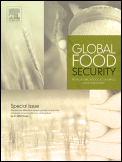
Global Food Security-Agriculture Policy Economics and Environment
Uniting disciplines to safeguard our global food systems.Global Food Security - Agriculture Policy Economics and Environment is a leading interdisciplinary journal published by Elsevier that addresses critical issues in food security through the lens of agriculture, economics, and environmental sustainability. With an impressive impact factor and a distinguished placement in the Q1 quartile across multiple categories including Ecology, Food Science, and Safety Research for 2023, this journal is a vital resource for researchers and practitioners aiming to address modern challenges in global food systems. Covering essential topics from agricultural policy to ecological implications, the journal provides a platform for innovative research and policy discussions that foster the advancement of food security on a global scale. Notably, it is indexed in Scopus, where it ranks in the top percentiles across its relevant categories, reflecting its significance in the field. The journal is accessible to a wide audience, making it an indispensable source of knowledge for professionals and students aiming to tackle the complex interplay between food production and environmental stewardship.

JOURNAL OF AGRICULTURAL ECONOMICS
Unveiling the economic dimensions of food production.JOURNAL OF AGRICULTURAL ECONOMICS, published by Wiley, is a leading scholarly journal dedicated to the field of agricultural economics. Since its inception in 1928, the journal has provided a platform for rigorous research, offering insights and analysis on the economic aspects of agriculture, food production, and rural development. With an impressive impact factor and ranked in the Q1 category in both Agricultural and Biological Sciences as well as Economics and Econometrics, it stands among the top-tier publications in its field. The journal's ISSN is 0021-857X, and it also has an E-ISSN of 1477-9552. Researchers, professionals, and students seeking to enhance their understanding of agricultural economic policies and practices will find invaluable resources, empirical studies, and theoretical discussions within its pages. The JOURNAL OF AGRICULTURAL ECONOMICS remains an essential conduit for advancing knowledge and shaping discussions that matter in the global agricultural economy.
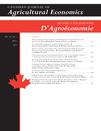
CANADIAN JOURNAL OF AGRICULTURAL ECONOMICS-REVUE CANADIENNE D AGROECONOMIE
Navigating the Future of Food Security and SustainabilityCanadian Journal of Agricultural Economics - Revue Canadienne d’Agroéconomie, published by Wiley, is a premier journal dedicated to the innovative and interdisciplinary study of agricultural economics. With an impressive impact factor highlighting its significance, this journal consistently ranks in the Q1 quartile across multiple categories, including Agronomy and Crop Science, Animal Science and Zoology, Ecology, Economics and Econometrics, and Global and Planetary Change. As part of its robust content, the journal spans articles from 1952 to 2024, contributing valuable insights into the interface of agricultural practices and economic theory. Researchers and professionals in the field will find this journal essential for exploring critical issues affecting agriculture, food security, and sustainability in a global context. Despite its traditional publishing model, the journal's rigorous peer-review process ensures high-quality scholarly contributions that are pivotal for advancing knowledge and academic discourse in agricultural economics.
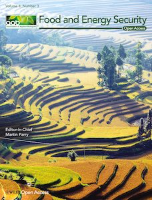
Food and Energy Security
Exploring the Nexus of Agriculture and Energy for a Sustainable TomorrowFood and Energy Security, an esteemed journal published by WILEY, is dedicated to advancing the fields of food science, agriculture, and renewable energy. Since its inception in 2012, this open-access journal has provided a platform for groundbreaking research and innovative practices that address global challenges related to food production and energy sustainability. With an impressive impact factor reflected in its Q1 quartile rankings across notable categories such as Agronomy and Crop Science and Food Science, this journal is instrumental for researchers and practitioners alike who are focused on enhancing food security and promoting sustainable energy solutions. The journal's scope encompasses multidisciplinary approaches and encourages submissions that explore the intersection of food systems and energy dynamics, ensuring relevance in the evolving landscape of environmental science and policy. By offering open access to its publications, Food and Energy Security commits to making vital research accessible, fostering informed dialogue and collaboration among scholars, policymakers, and the agrifood industry worldwide.

JOURNAL OF AGRICULTURAL AND RESOURCE ECONOMICS
Exploring innovative solutions for resource management.Journal of Agricultural and Resource Economics is a pivotal platform in the realm of agricultural and resource economics, published by the Western Agricultural Economics Association. Since its inception, the journal has embraced an Open Access model, fostering widespread dissemination of research findings to benefit both scholars and practitioners in the field. The journal operates within an impressive global ranking framework, resting in Q2 across several pertinent categories including Agronomy and Crop Science, Animal Science and Zoology, and Economics and Econometrics. With its ISSN 1068-5502 and E-ISSN 2327-8285, it has garnered attention for its rigorous academic standards and impactful contributions to the discourse on resource management and agricultural practices. Researchers, professionals, and students alike will find the journal's ongoing commitment to advancing knowledge invaluable, with publications that span from 1996 to 2024 capturing evolving trends and insights in the sector.

Journal of Agriculture and Food Research
Exploring the Future of Food and FarmingJournal of Agriculture and Food Research, published by ELSEVIER, is a premier Open Access journal that has made significant strides in the fields of agricultural and biological sciences since its launch in 2019. With an ISSN of 2666-1543, the journal is headquartered at Radarweg 29, 1043 NX Amsterdam, Netherlands. It holds a remarkable position in the 2023 Category Quartiles, achieving Q1 rankings in Agricultural and Biological Sciences (miscellaneous), Agronomy and Crop Science, and Food Science. The journal's impactful research is reflected in its impressive Scopus ranks, including a ranking of #25 in Agricultural and Biological Sciences, showcasing the journal's commitment to high-quality, innovative research relevant to contemporary agricultural challenges. Researchers, professionals, and students can benefit from its diverse array of published works, fostering a greater understanding of food security, sustainable agriculture, and innovative food technologies. By embracing an open access model, the journal ensures that critical research is readily available to a global audience, aiming to enhance knowledge dissemination in this vital field.
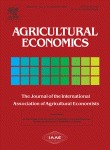
AGRICULTURAL ECONOMICS
Elevating understanding of global agricultural dynamics.AGRICULTURAL ECONOMICS, published by Wiley, is a premier journal dedicated to advancing the understanding of agricultural economics, with an ISSN of 0169-5150 and an E-ISSN of 1574-0862. This esteemed publication serves as a vital resource for researchers, professionals, and students in the fields of Agronomy and Crop Science, as well as Economics and Econometrics, consistently reflecting its high standing as evidenced by its 2023 Q1 ranking in both categories. With a comprehensive scope spanning from 1986 to 2024, the journal presents rigorous analysis and innovative research that informs policy decisions and enhances agricultural practices globally. Although it does not provide open access options, the rich academic content invites a dedicated readership committed to strengthening the agricultural sector through evidence-based insights. The journal is particularly noted for its impressive Scopus rankings, placing it among the top-tier resources for understanding the complex interplay between economic theory and agricultural development.
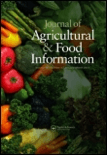
Journal of Agricultural & Food Information
Transforming Research into Actionable Food Solutions.Welcome to the Journal of Agricultural & Food Information, a pivotal platform for disseminating research and insights across the domains of agronomy, food science, and information systems management. Published by Routledge Journals, Taylor & Francis Ltd, this esteemed journal, with an ISSN of 1049-6505 and E-ISSN 1540-4722, plays a crucial role in bridging the gap between innovative agricultural practices and food information systems. Despite its current categorization in the Q4 quartile across relevant fields, it remains committed to fostering scholarly dialogue and encouraging interdisciplinary collaboration. With a history of publication spanning multiple converged years from 1993 to 2024, the journal is dedicated to publishing high-quality, peer-reviewed articles that address the challenges and advancements in agricultural and food information. Currently not available as Open Access, this journal provides valuable insights for researchers, professionals, and students who are eager to harness information for the progress of food security and sustainable agricultural practices. Join the conversation in enhancing our understanding and application of vital agricultural and food-related information.
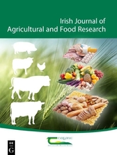
IRISH JOURNAL OF AGRICULTURAL AND FOOD RESEARCH
Bridging theory and practice in food science and ecology.Welcome to the IRISH JOURNAL OF AGRICULTURAL AND FOOD RESEARCH, an esteemed publication dedicated to the advancement of knowledge in the fields of agronomy, animal science, ecology, and food science. Published by TEAGASC, this journal has embraced open access since 2015, facilitating the dissemination of groundbreaking research to a global audience. With a robust ISSN of 0791-6833 and an E-ISSN of 2009-9029, the journal ranks in the third quartile (Q3) across multiple categories, highlighting its relevance and influence within the scientific community. The journal aims to serve as a platform for researchers and practitioners to share innovative findings and foster interdisciplinary collaboration to address pressing agricultural and food security challenges. With a focus on empirical and theoretical research, the IRISH JOURNAL OF AGRICULTURAL AND FOOD RESEARCH is vital for those seeking to make significant contributions to these critical areas of study.

Agricultural Economics-Zemedelska Ekonomika
Unlocking the potential of agricultural productivity.Agricultural Economics-Zemedelska Ekonomika is a prominent open-access journal published by the Czech Academy of Agricultural Sciences, dedicated to advancing the field of agricultural economics and related disciplines. Since its inception in 2007, this journal has provided a vital platform for researchers, professionals, and students to disseminate and engage with cutting-edge insights and empirical studies that contribute to the understanding of agricultural practices, economic theories, and policy analysis. With an impressive impact factor reflected in its 2023 quartile rankings of Q2 in both Agricultural and Biological Sciences and Economics, Econometrics and Finance, the journal ranks highly among its peers, specifically occupying the 46th position out of 288 in General Economics and 40th among 193 in Agricultural Sciences, highlighting its broad relevance and respected status. The journal's open access model ensures that research is widely disseminated and easily accessible, fostering an inclusive academic environment that encourages collaboration and knowledge sharing. With a commitment to publishing quality research until at least 2024, Agricultural Economics-Zemedelska Ekonomika remains a crucial resource for those dedicated to improving agricultural productivity and sustainability through economic insight.